
活動訊息EXHIBITION AND EVENT INFORMATION
-
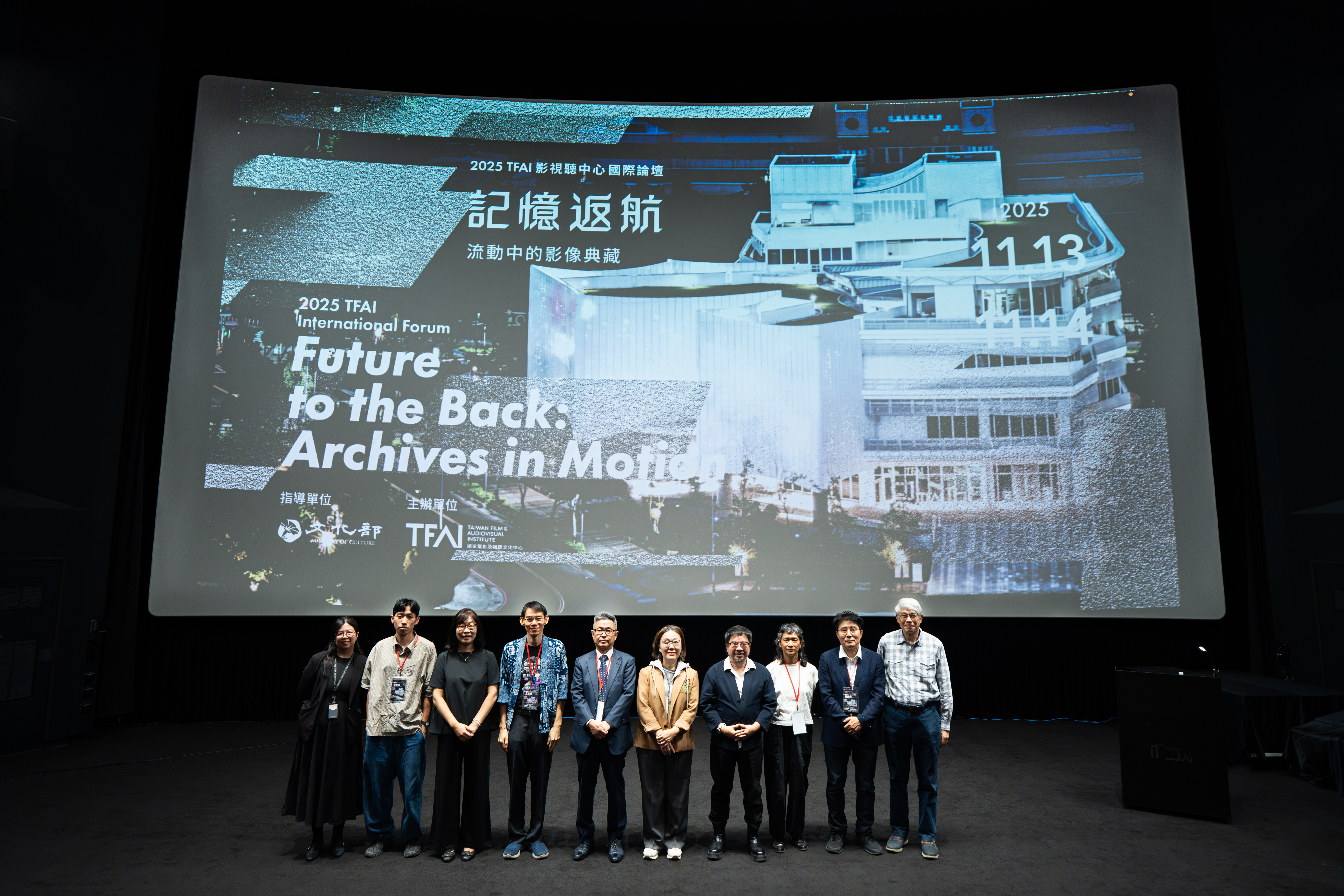 MORE
MORE -
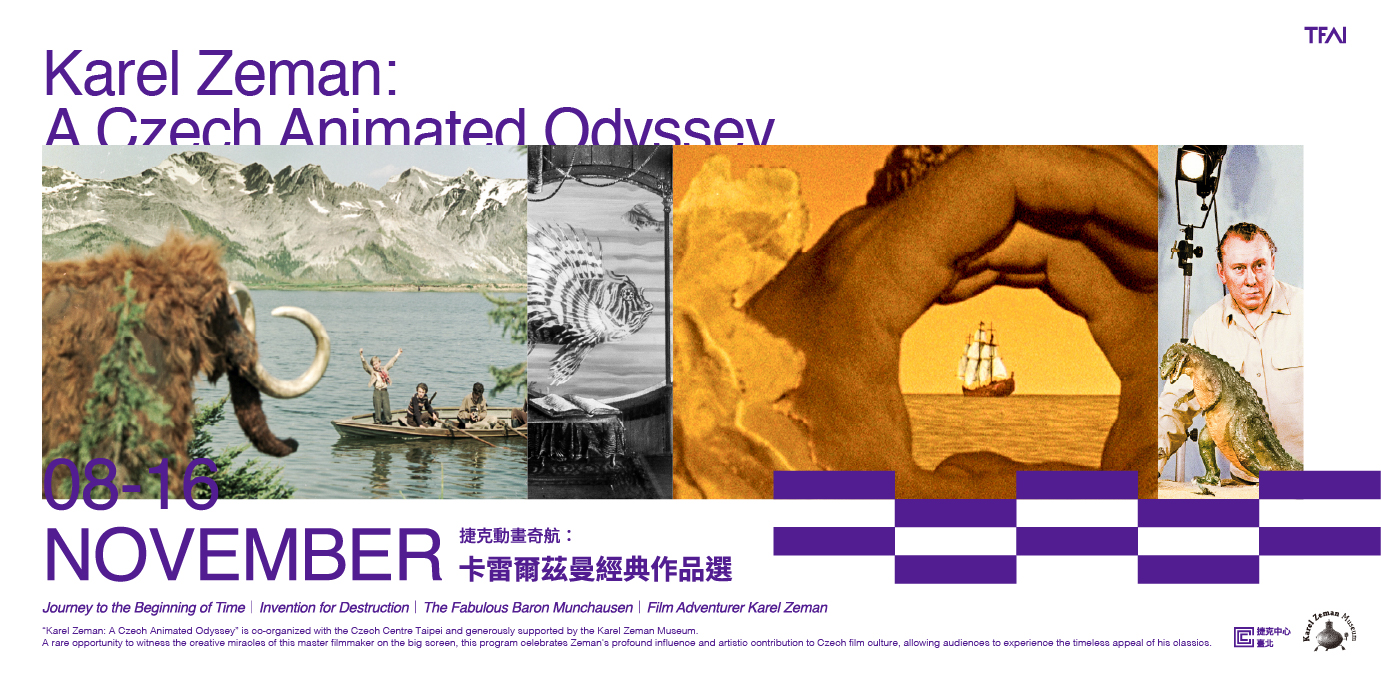 MORE
MORETFAI and Czech Centre Taipei Present Special Program Celebrating Karel ZEMAN, the Legendary “Czech Magician of Animation
The works of legendary Czech animator and filmmaker Karel ZEMAN are being screened in Taiwan for the very first time as the Taiwan Film and Audiovisual Institute (TFAI) and Czech Centre Taipei team up to present the special program “Karel Zeman: A Czech Animated Odyssey.” At the opening ceremony (Nov. 8), David STEINKE, Head of the Czech Economic and Cultural Office Taipei, and Markéta Lipold ZÁHUMENSKÁ, Director of Czech Centre Taipei, both delivered remarks before the screening of the opening film Journey to the Beginning of Time (1955), offering audiences and animation enthusiasts deeper insights into the “Czech magician of animation.” ➤The opening was held on November 8th, featuring special guests including David STEINKE (left), Representative of the Czech Economic and Cultural Office, and Markéta Lipold ZÁHUMENSKÁ (center), Director of the Czech Centre Taipei. On the right is Arthur CHU, Chairperson of TFAI. (Courtesy of TFAI) More than 70 years ago, long before the age of computer and AI-generated animation, Karel ZEMAN was already creating astonishing animated films entirely by hand. The opening film, Journey to the Beginning of Time, follows four boys on an extraordinary adventure into prehistoric times. As they row their boat past glaciers and witness dinosaurs locked in combat, the landscapes around them unfold like mesmerizing museum exhibits, as though they have stepped into the pages of an encyclopedia. ZEMAN combined live-action footage with stop-motion puppetry and physical and optical film techniques such as multiple exposure, ingeniously bringing prehistoric creatures and the young adventurers together in the same time and space. According to the Representative of the Czech Economic and Cultural Office in Taipei David STEINKE, “When I was a 6-year-old boy, Journey to the Beginning of Time was already my favorite film. It really triggered my imagination. I wanted to be one of the four guys, who are on the boat drifting on the river of time to the beginning of the history.” STEINKE also invited the young audience who had brought dinosaur models to come up on stage to share with the public, showing the irreplaceable shared memory across generations. ➤David STEINKE, Representative of the Czech Economic and Cultural Office. (Courtesy of TFAI) “Karel ZEMAN: A Czech Animated Odyssey” will feature four films in total, including three 4K-restored animated classics: Journey to the Beginning of Time, the opening film; Invention for Destruction (1958), which mimics the texture of illustrated storybooks, making it feel as though the drawings themselves have come to life; and ZEMAN’s celebrated masterpiece The Fabulous Baron Munchausen (1961), a fantastical love story between a modern astronaut and a medieval princess set against the romantic backdrop of the moon. The final selection of the program is the documentary Film Adventurer Karel Zeman (2015), in which renowned filmmakers from around the world reflect on how ZEMAN’s works have influenced their own creative journeys. Arthur CHU, Chairman of TFAI, added that “Czech culture has always left a deep impression on me. I first visited Prague in 1996, and the statues on the Charles Bridge and the local art of puppetry made me believe that Czech people grow up surrounded by a fairytale-like world of wonder. This unique sense of beauty and imagination naturally finds its way into their filmmaking.” ZEMAN pushed beyond the technological limits of his time, demonstrating unmatched patience and imagination that went on to influence generations of animators and filmmakers. Tim BURTON, director and executive producer of the hit series Wednesday, and Wes ANDERSON, beloved by cinephiles for his masterful visual composition, are among those deeply inspired by ZEMAN’s work. ➤CHU said that he was impressed by Prague’s architecture and sculpture. (Courtesy of TFAI) The special program “Karel Zeman: A Czech Animated Odyssey” is presented with the full support of the Karel Zeman Museum in the Czech Republic, with the hope that Taiwanese audiences will gain a deeper appreciation of Czech film culture and ZEMAN’s artistic contributions to the history of world animation. Markéta ZÁHUMENSKÁ, Director Czech Centre Taipei, remarked: “For Czech people, ZEMAN is more than just a filmmaker. He represents something we grow up with. My parents watched his films, and so did I when I was small. I truly believe one day my children will watch his films. Therefore it is a great honor to have the opportunity to share this cinematic experience with audiences in Taiwan!” The screenings will take place exclusively in November at TFAI’s Xinzhuang headquarters, where the first-floor lobby has been transformed into a re-creation of the iconic dinosaur scene in the film, making it the perfect backdrop for photos and social media check-ins. Brimming with imaginative storytelling and fantastical visuals, the program promises to dazzle viewers of all ages and offer animation fans a truly breathtaking experience on the big screen. Karel Zeman: A Czech Animated Odyssey Date: November 8-16, 2025 Venue: Taiwan Film and Audiovisual Institute Ticket Information: https://tfaitw.pse.is/8ak44j -
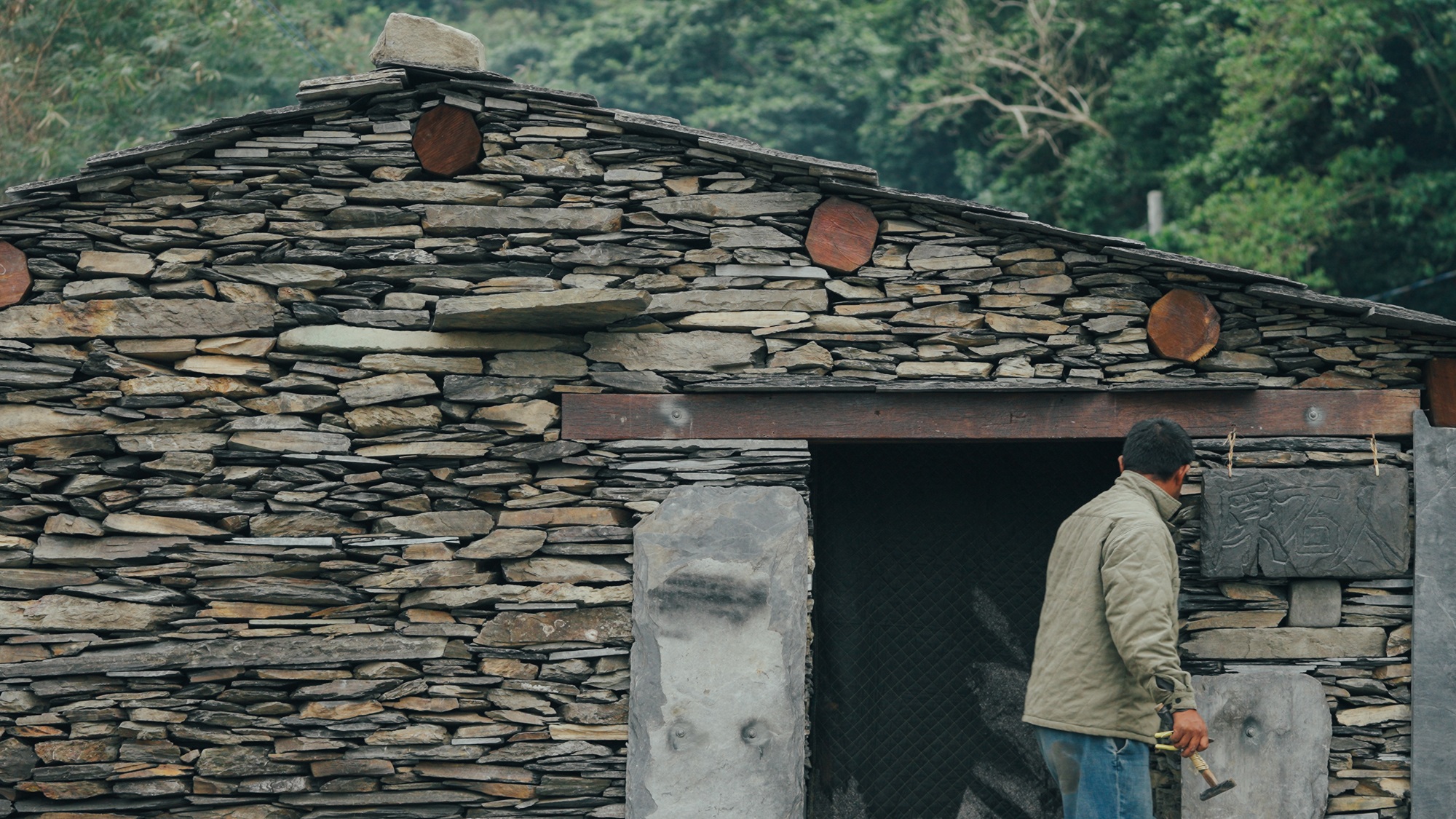 MORE
MORECanada’s RIDM to Showcase 12 Taiwanese Documentaries
The Taiwan Film and Audiovisual Institute (TFAI)’s Taiwan Docs promotion platform and the Taiwan International Documentary Festival (TIDF) are joining forces with the Rencontres internationales du documentaire de Montréal (RIDM) for the first time this year to present “Focus Taiwan: Beyond the Frame.” Taking place from November 20 to 30, this large-scale program will present 12 Taiwanese documentaries and experimental films, with five filmmakers and one DJ traveling to Montréal to attend the festival in person. In addition to the screenings, the program will also include a live cinema performance, panel discussion, and a Taiwan Night. In addition, two Taiwanese projects are invited to the industry event, Forum RIDM, to participate in pitches and workshops, reflecting the vibrant diversity of Taiwan’s documentary landscape. Founded in 1998, RIDM is renowned for its bold, innovative, and artistically driven curatorial approach, drawing countless audiences and establishing it as one of North America’s most iconic documentary film festivals. The Forum RIDM, which brings together more than 500 industry professionals every year, is dedicated to nurturing emerging talents and fostering the creation of new works. This year’s “Focus Taiwan: Beyond the Frame.” marks RIDM’s first country-focused program in many years. Featuring a robust lineup of films and events, the program has generously invited several Taiwanese filmmakers to attend in person, underscoring its genuine commitment and deep appreciation of Taiwanese documentaries. This large-scale collaboration was made possible thanks to the generous support of the Taipei Cultural Center in New York and the Taipei Economic and Cultural Office in Montréal. “Focus Taiwan: Beyond the Frame” opens with SO Yo-hen’s award-winning Taman-Taman (Park), and features a diverse lineup that includes the North American premiere of Sayun Simung’s SPI; LO Yi-shan’s After the Snowmelt, a personal reflection on grief following a friend’s mountaineering accident; LAU Kek Huat’s Taste of Wild Tomato, which delves into the lingering trauma of Taiwan’s February 28 Incident; and WU Tzu-an’s This Shore: A Family Story, which explores his family history spanning Taiwan and the United States. These five feature-length films, each distinct in theme and style, either confront pressing social issues in contemporary Taiwan or unfold from profoundly personal perspectives, inviting audiences to look beyond the surface of the image and peer into the ideas, histories, and realities that shape Taiwanese cinema today. ➤ The showcase opens with SO Yo-hen’s award-winning Taman-Taman (Park) Moreover, the program also features six experimental short films, highlighting the creativity and vitality of Taiwanese filmmakers. These include HUNG Wei-lin’s K’s Room—the Creation and Destruction of the World; HUANG Pang-chuan’s Last Year When the Train Passed By; Johan CHANG’s Flight and Frame; Erica SHEU’s don’t be afraid let it show; WU Tzu-an’s The Embryo's Dream, Upon the Moon; and Fur Film Vol.1: I don't own a cat, co-directed by WU Tzu-an and Erica SHEU. The live cinema event will screen HUANG Pang-chuan and Chunni LINs’ silent work This Is Not a Film by Deng Nan-guang, accompanied by a live music performance by Taiwanese DJ and electronic music artist Vice City, who will infuse new life into the images of Taiwan’s people and landscapes captured during the Japanese colonial era. ➤ The silent work This Is Not a Film by Deng Nan-guang, accompanied by a live music performance by Taiwanese DJ and electronic music artist Vice City. To provide audiences with deeper insights into the creative context of Taiwanese documentary filmmaking, RIDM has invited directors SO yo-hen, HUNG Wei-ling, WU Tzu-an, Sayun Simung, and LO Yi-shan to Montréal to attend the festival. Meanwhile, the Taiwanese projects invited to Forum RIDM are Celin Yi Hui SU’s Da Ra Song, which was selected for the Rough Cut Pitch, and WU Tzu-an’s Hollow Ship, Drift through the Void!, a selection of Doc Lab Montréal. CHEN Wanling, Head of Documentary at TFAI, has also been invited to join the Taiwan Forum and serve as one of the industry decision-makers at Forum RIDM. ➤ Sayun Simung’s SPI has its North American premiere at RIDM. TFAI’s Taiwan Docs continues to maintain strong relationships with key international documentary organizations, actively promoting the global visibility of Taiwanese documentaries through different collaborative channels, while also supporting Taiwanese filmmakers in expanding their international presence, building networks, and connecting with the global industry. This year, Taiwan Docs has successfully facilitated Taiwanese documentary showcases in the UK, Germany, Canada, South Korea, Japan, Indonesia, the US, Thailand, France, and Hungary. For the latest updates, please follow the Taiwan Docs official website, Facebook page, and Instagram account. -
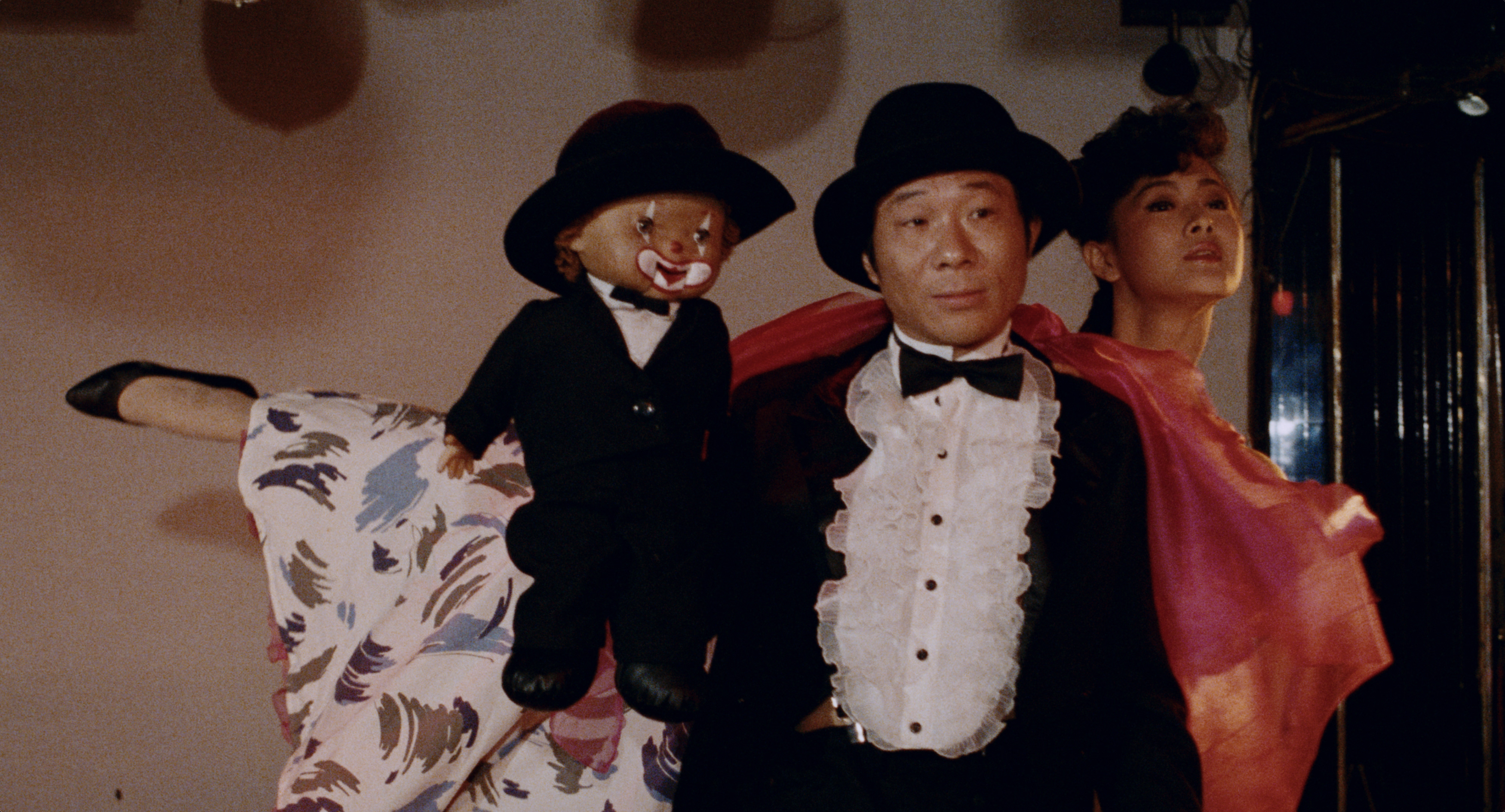 MORE
MORETFAI Marks the 40th Anniversary of The Clown and the Swan with the World Premiere of Its Digitally Restored Version, Honoring the Legacy of HSU Pu-liao
In just six short years, legendary Taiwanese comedian HSU Pu-liao created a box-office phenomenon that reshaped local comedy. To mark the 40th anniversary of his final film, The Clown and the Swan (1985), the Taiwan Film and Audiovisual Institute (TFAI) will host the world premiere of its digitally restored version on Friday, October 24, 2025, at the institute’s Outdoor Plaza in New Taipei City. This screening celebrates TFAI’s annual restoration achievements and invites both new audiences and longtime fans to rediscover the humor, humanity, and tragedy behind the “HSU Pu-liao phenomenon” that once swept Taiwan’s entertainment world. A Comedic Legend’s Rise and Tragic Fall “HSU Pu-liao is dead!” — on July 4, 1985, Taiwanese newspapers ran this shocking headline in bold white letters on a black background, reflecting the sudden loss of a beloved yet troubled performer. Trained in circus acts and magic as a child, HSU began performing in cabarets and television shows before transitioning to film. His exaggerated physical comedy and natural charisma made him a household name in the early 1980s. Yet fame came at a cost. His guaranteed box-office draw attracted the attention of the criminal underworld, and the grueling pace of nonstop film shoots, compounded by alcoholism and drug dependency, took a devastating toll on his health. ➤HSU Pu-liao applies clown makeup in the black-and-white opening scene of The Clown and the Swan. (Courtesy of TFAI) HSU passed away just as The Clown and the Swan was released. Ironically and poignantly, the film became the biggest box-office hit of his career, with audiences across Taiwan laughing and crying through his final performance. As one reporter described, “That summer, every cinema in Taiwan became HSU Pu-liao’s memorial hall.” TFAI’s 100th Restoration: A Mirror of Life and Art Marking TFAI’s 100th restoration project, The Clown and the Swan tells the story of A-kun (played by HSU Pu-liao), a washed-up entertainer, and A-chu (played by CHEN Hsiu-chen), a cabaret dancer, who fall in love while struggling through the highs and lows of show business. Their story mirrors HSU’s own life—a blend of laughter and sorrow. Director Kevin CHU recalled, “In the opening scene, I used black-and-white footage of HSU putting on his clown makeup. I had never used black and white before, and even now, I still wonder why I made that choice—it feels almost fated.” CHU and HSU first collaborated on The Clown (1980), launching both to fame. Over the years, they made five films together, forming one of the most iconic partnerships in Taiwanese cinema. CHU also vividly remembered real gangster disruptions on set: “Men once stormed the studio with samurai swords—it wasn’t just a rumor.” What moved him most, however, was HSU’s professionalism: “Even with a broken leg, and his body covered in injection marks and infections, he insisted on finishing the shoot.” ➤Director Kevin CHU praised HSU Pu-liao: “His tragicomedy performances were absolutely first-rate.” (Courtesy of TFAI) A Glimpse of 1980s Taipei “He could make people laugh just by sitting there,” said Kevin CHU. “He was a born comedian, full of emotion and vulnerability. His tragicomic acting was truly first-rate.” Beyond its performances, The Clown and the Swan offers a rare time capsule of 1980s Taipei. The film features now-vanished landmarks such as the Taipei Children’s Recreation Center, Taipei Fine Arts Museum, Taipei Botanical Garden, Chunghwa Market, Rixin Theater on Ximending’s cinema street, Banqiao Datong Water Park, and even illegal housing along Ren’ai Road. These once-familiar cityscapes will come alive again on the big screen. Free Outdoor Screening for UNESCO’s World Day for Audiovisual Heritage In celebration of UNESCO’s World Day for Audiovisual Heritage, TFAI will host a free outdoor screening of the digitally restored The Clown and the Swan on Friday evening, October 24, 2025. The event will feature live clown performances, director Kevin CHU in attendance, and free commemorative gifts and light refreshments. Audiences are invited to relive the brilliance of HSU Pu-liao—Taiwan’s “Charlie Chaplin”—on the big screen once more. -
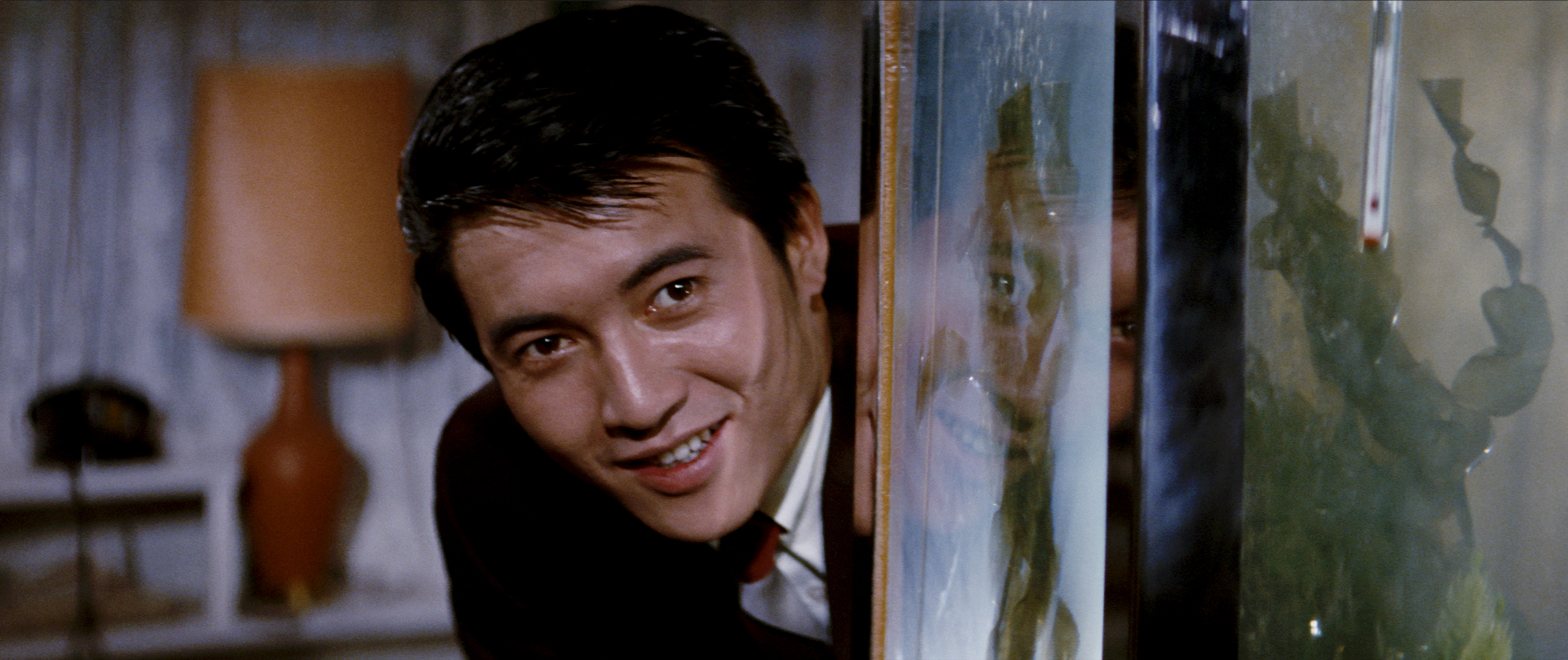 MORE
MOREGolden Horse Best Actor’s Most Iconic Performance Returns to Kaohsiung! TFAI and Kaohsiung Film Festival Present “Tribute to PAI Ching-jui,” Reviving KO Chun-hsiung’s Timeless Charisma Across Generations
Kaohsiung (October 20, 2025) — Now in full swing, the 2025 Kaohsiung Film Festival has joined hands with the Taiwan Film and Audiovisual Institute (TFAI) to present the special program “Tribute to PAI Ching-jui(致敬・白景瑞).” The program pays homage to the acclaimed filmmaker who received both the Golden Horse Award for Best Director and the Lifetime Achievement Award. Three of PAI’s representative works—Lonely Seventeen (寂寞的十七歲, 1967), Accidental Trio (今天不回家, 1969), and Good Bye! Darling (再見阿郎, 1970)—were screened in newly restored digital versions, revisiting Kaohsiung’s cinematic past and bringing the late Golden Horse Best Actor KO Chun-hsiung(柯俊雄) back to the big screen in all his youthful brilliance. In the 1960s, PAI Ching-jui traveled to Europe to study film and was profoundly influenced by Italian Neorealism. His filmmaking approach—emphasizing on-location shooting and natural lighting—stood in contrast to the “Healthy Realism” trend that was taking shape in Taiwan, enabling him to authentically capture the cityscapes and social atmosphere of the era. ➤TFAI Chairman Arthur CHU remarked: “Lonely Seventeen is not merely a coming-of-age story; it reflects the social imagination and emotional landscape of its time.” (Courtesy of Kaohsiung Film Festival) After the screening of Lonely Seventeen on October 18, TFAI Chairman Arthur Chu(褚明仁) addressed the audience: “Lonely Seventeen is not merely a coming-of-age story; it reflects the social imagination and emotional landscape of its time. Even after half a century, we can still feel its sincerity and strength.” He added: “In the industrializing Kaohsiung of the 1960s, countless local laborers carried Taiwan’s progress forward. Screening these films in Kaohsiung today allows us to revisit that era and applaud the city and the people who shaped it.” ➤TFAI Chairman Arthur CHU noted that seeing PAI’s works return to their original filming locations and reconnect with audiences is “a rare and magical cinematic experience.” (Courtesy of Kaohsiung Film Festival) When Lonely Seventeen premiered in 1967, it swept multiple prizes at the 6th Golden Horse Awards, including Best Director, Best Color Cinematography, Best Editing, and Best Sound Recording—an enduring testament to its significance. Interestingly, KO Chun-hsiung, who starred in both Lonely Seventeen and Good Bye! Darling, grew up in Kaohsiung, while Accidental Trio also features scenes filmed in the city. For local audiences, the return of these restored works to Kaohsiung marks a rare and magical encounter with Taiwan’s cinematic history. As part of the program, poet, filmmaker, and theatre director Hung Hung(鴻鴻)delivered a special lecture titled “The Magician of Desire — The Cinematic Spectrum of PAI Ching-jui.” He shared that the three films not only highlight PAI’s distinct personal style but also revolve around the central theme of desire. “During the Martial Law period, and under the constraints of the Mandarin-language policy, PAI Ching-jui still managed to depict deeply local, realistic environments infused with symbols of desire—something truly remarkable,” Hung Hung remarked. In Lonely Seventeen, a teenage girl becomes ensnared in the complexities of first love; Accidental Trio uses multiple narratives to explore the frustrations of middle-class families seeking escape from routine life; and in Good Bye! Darling—adapted from CHEN Yingzhen’s short story Generals—the young woman Kuei-chih elopes with the drifter A-lang to Kaohsiung, only to find him consumed by the city’s temptations. Hung Hung further noted: “PAI pioneered the three-hall romantic film genre and excelled at urban comedies. Though market forces later favored melodramas, he continued to push visual experimentation within commercial forms.” ➤ “During the Martial Law period and under the Mandarin-language policy, PAI Ching-jui still managed to depict deeply local, realistic environments infused with symbols of desire—something truly remarkable,” said Hung Hung. (Courtesy of Kaohsiung Film Festival) He also emphasized how Good Bye! Darling showcases KO Chun-hsiung’s enduring magnetism: “A-lang is far from a likable character, yet through KO’s performance, this volatile, instinct-driven man radiates wild charisma. At just 25 years old, KO embodied an energy that still captivates audiences today.” The screenings marked the Taiwan premiere of the digitally restored Lonely Seventeen and the Asian premieres of the restored Accidental Trio and Good Bye! Darling. Even after more than fifty years, PAI Ching-jui’s explorations of human desire and modern life continue to resonate with contemporary viewers.
